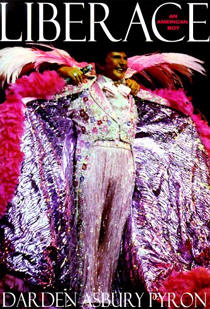 |


|
|
Liberace: An American Boy, by Darden Asbury Pyron; University of Chicago Press; 494 pages; $27.50.
Liberace: An American Boy is the first serious life study of Wladziu Valentino Liberace (1919-1987), the celebrated pianist and Showman who continues to amaze us today. As an artist and public figure, "Lee" Liberace always seemed to be over the top; with his fur coats, feather boas, elaborate candelabra and endless succession of young "chauffeurs". But, as Pyron tells us, Liberace was very much "an American boy". He was born in West Allis, Wisconsin, and until his death he kept his Midwestern speech, manners and beliefs. He loved his mother, at least publicly, and was a devout Catholic and a political conservative. "The trajectory of his career, and his ambition, energy, perseverance, and good nature all represent elements of his baptism in Midwestern American values. He was the working-class son of immigrants who seized the brass ring of American promise to make his own way through hard work to fabulous wealth and fame." And what's more American than that? Of course, Liberace was gay, and his sexuality was a major, if unacknowledged, part of his public image. Though most men despised Lee's fey persona, women adored him, precisely because "he was a desirable, attractive man . . . purged of masculine loutishness."
In fact, in his lifetime Liberace was a very active, even promiscuous, homosexual. According to gay director Carl David, Liberace "wasn't discreet, he was daring and rather outrageous about" his sexual appetites. Liberace: An American Boy tells us about the Showman's flings with actor Rock Hudson--before Hudson became a star--and writer John Rechy. We also hear "stories" about "cruising Mexican boys on Sunset Boulevard, picking up weightlifters, or taking on young people out of a chorus like, or in the case of [Scott] Thorson . . . and his successor, Cary James, latching onto unsteady teenagers." In later years, Lee would become less concerned about public exposure, as when he visited an "adult book store" in Fort Lauderdale (1981). We get most of this information from Thorson, who naturally had a grudge against Liberace--he later sued his former lover for palimony--but other sources confirm the pianist's careless promiscuity. Liberace: An American Boy runs to almost 500 pages, including Notes and an Index. Since there's not enough information about Liberace to fill 500 pages, Pyron pads his book with long discussions about such topics as television, Las Vegas and, of course, homosexuality. Though they all influenced Liberace (and vice versa), Pyron's book would have been better without such digressions. Even worse is Pyron's attempt to analyze every aspect of Liberace's life, as when he devotes five pages to a psychosexual study of I'll Be Seeing You, Liberace's signature song. Why can't Pyron just say that it is a nice song and leave it at that? If anything, Pyron is thorough to a fault. Since Lee Liberace's AIDS-related death in 1987, various authors have written about the Showman's life with varying results. None of them have done as good a job at it as Darden Asbury Pyron. Before reading this book, I thought of Liberace as either a novelty act or an embarrassment. Pyron made me see Liberace in a new light; as a great artist, a fascinating public figure, and a gay man of his time. This is the greatest compliment that a reader can pay to a biographer, or a biographer to his subject. |
 © 1997-2000 BEI
© 1997-2000 BEI
 Darden Asbury Pyron is a Professor of History at Florida International
University (I was one of his students) who during the past decade began a
second, successful career as a biographer. His first book, Southern
Daughter: The Life of Margaret Mitchell (1991) is the definitive biography
of the author of Gone With the Wind.
Darden Asbury Pyron is a Professor of History at Florida International
University (I was one of his students) who during the past decade began a
second, successful career as a biographer. His first book, Southern
Daughter: The Life of Margaret Mitchell (1991) is the definitive biography
of the author of Gone With the Wind.